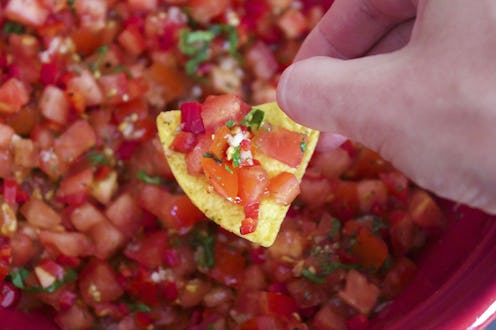Life
Scientists Prove Double Dipping Is A No-No

You're at a party, huddled around a bowl of chips and dip with other party-goers, taking turns grabbing, swooping and chomping — and it's all good, until one person grabs, swoops, chomps and swoops again. The double-dip bandit, the party-goer faux pas, the chip jerk, the salsa scrooge, the germinator — yes, it's finally been proven, a study on double dipping has been released and it's as crawling with evidence as you feared.
The Scientific American did a fun experiment by testing double dipping in four different mediums: water, salsa, chocolate, and cheese. Their findings were more sneeze-significant than Outbreak-significant, but important to note, nonetheless. In all dips that were not graced with already bitten chips, the bacterial levels were nonexistent. Once the chips were bitten and double dipped, the bacterial levels began to rise. Water was the highest host for bacteria, obviously, as it acts as a petri dish — which is fine, because who the hell uses water as a dip? Salsa came next in line with bacteria wealth, followed by cheese and chocolate who had very low traces of bacteria. What's interesting however, is that after a few hours, the acidity in the salsa fought off the high bacteria levels and made it much more comparable to chocolate and cheese.
So, should we start wearing medical masks to holiday parties and bring double-dippers to the guillotine? Not so fast. Scientists compare double dipping to sneezing, it's creates an opportunity for bad bacteria to spread, but it's not necessarily going to instantly infect someone with whatever they're carrying. But during the holiday season, when everyone is forcing themselves out of the house even though they've been carrying around a contagious, relentless cold for weeks, it's absolutely not a good idea to double dip or to share salsa with a double dipper.
Image: Pixabay